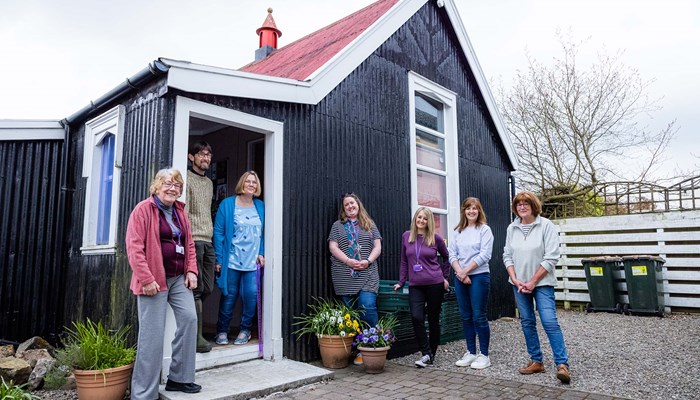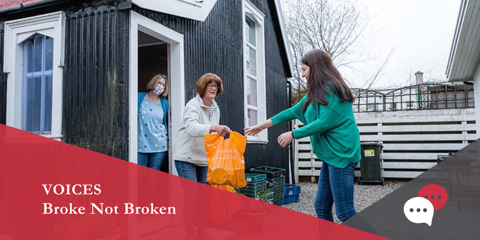"Whilst we do what we can to make the food bank experience as dignified as possible, our aim is for no-one to ever have to use a food bank. We work with local advisory groups (CAB and Welfare Rights) to ensure people are getting the benefits and financial support they are entitled to, but people need more support, and more money in their pockets." Annie McCormack, Chair of Broke Not Broken
What is your organisation working to achieve?
At Broke Not Broken, our organisation’s aim is to tackle the effects of poverty in Kinross-shire. In a nutshell, we want to eradicate poverty. We are doing this through a series of projects that target specific challenges our area faces. These include fuel poverty, food insecurity, child poverty, and mental health support.
Where are you focusing your support right now?
Our support at the moment is very much focused on food support, energy payments, and mental health support. We put dignity at the heart of our charity and work as hard as we can to add a participative element in terms of how our projects run. We offer a choice of supermarket vouchers for clients and add fresh fruit vegetables and dairy to their food parcels. Many clients then put themselves forward as volunteers for other projects such as the women’s group, and family away days.
How do poverty and trauma figure in your work?
Poverty is the lead focus of our work, mitigating it but also working hard on a national and policy level to try and work towards a cash first approach to eradicating poverty in Scotland. We work with the Poverty Alliance and Independent Food Aid network on campaigns to do this. We also take a creative approach to challenging the effects of poverty, not just the financial ones, but also isolation and stigma. We are part of a Third Sector Task Force in Perth and Kinross to push for the Real Living Wage, and other policy changes within our local authority. The trauma we see in people that they have gathered through being in poverty is immense and lifelong, and our counselling service offers open-ended support, averaging 20 sessions per person and leaving them with a tool box to cope with further challenges in their lives.

How can funders support your work?
We encourage funders to support by checking in regularly, establishing a relationship with us. Whilst we know monitoring reports are important, we like to feed back information as it comes up, and invite funders to attends events and workshops that we might hold so they can hear first hand what we are doing. It would be great to do something like this specifically for funders. Also, being flexible, understanding one of our strengths is being agile and responsive to events as they happen eg covid and the cost of living crisis.
What changes would you like to see in your area of focus during the next five years?
We would love for the emergency side of things to go back to being emergency provision, instead at the moment they are being normalised, by referral agents, by local authorities and by government eg food bank, energy payments, uniform bank etc. We would prefer to see ourselves move towards advocacy, supporting people getting financial support through Citizens advice, DWP, SocSecScot and Welfare Rights.
What long-term system changes would best address the issues?
A cash first approach and undoing the normalising of emergency food aid as a long term fix for poverty, it isn’t. Whilst we do what we can to make the food bank experience as dignified as possible, our aim is for no-one to ever have to use a food bank. We work with local advisory groups (CAB and Welfare Rights) to ensure people are getting the benefits and financial support they are entitled to, but people need more support, more money in their pockets.
How Broke Not Brokens work fits with our 2020-2030 strategy
We know from research that living in a rural area provides challenges that restrict opportunities to access services and support, and places people at more risk of experiencing poverty and/or trauma.
Broke Not Broken aims to mitigate the effects that this presents for their community by ensuring support is available locally such as their counseling service and advice hub. Being community-led is at the center of their approach, and they understand that poverty is an intersectional problem, complex and often difficult to unpick. They build relationships based on trust and dignity with their local community and that is why their work is closely aligned with our strategy.
Susan Lennertson, Funding Officer

